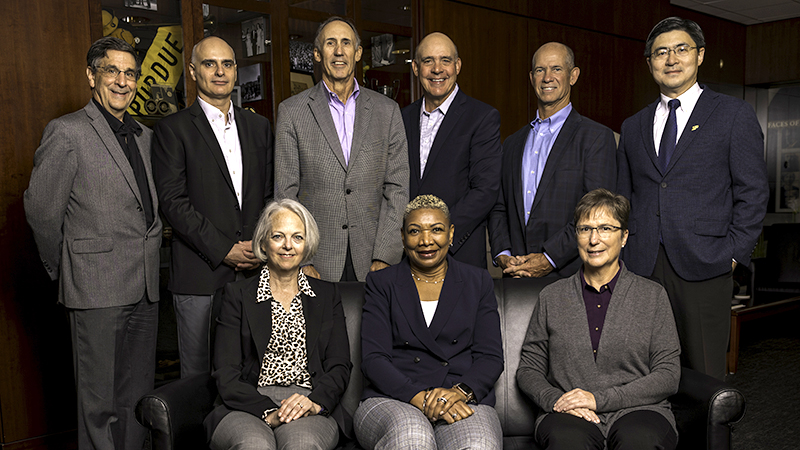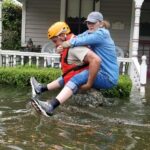New Military Advisory Board to boost Purdue’s Online Learning 2.0 initiative
Goal is to better meet the needs of veterans, uniformed personnel and their families
WEST LAFAYETTE, Ind. – A new Purdue Online Learning 2.0 Military Advisory Board will help identify avenues to advance Purdue’s overarching objective of educating and supporting more military-affiliated students, especially through the unmatched continuum of online educational programs Purdue offers.
Purdue President Mung Chiang said the aim is to better understand the educational needs of military veterans and uniformed personnel and to remain a trusted partner in meeting those needs with high-quality, innovative online programs delivered at scale.
Chiang’s Online Learning 2.0 initiative consists of two coordinated efforts: Purdue Global as a virtual campus for working adults with an emphasis on bachelor’s degree completion and workforce training and Purdue University Online as the online extension of the West Lafayette campus with an emphasis on graduate-level degrees and certifications serving working professionals.
Purdue has a goal of doubling military-affiliated online learners by 2026. Purdue Global serves approximately 10,000 military-affiliated students, including uniformed personnel, veterans and eligible dependents. Purdue University Online serves hundreds of military-affiliated students.
The new advisory board includes an impressive and diverse group of retired senior military leaders, some of them with Purdue ties. The board members include Navy Fleet Master Chief April Beldo, Navy Vice Adm. Kendall Card, Air Force Maj. Gen. Theresa Carter, Army Lt. Gen. Karen Gibson, Coast Guard Adm. Charles Ray, Navy Vice Adm. Scott Van Buskirk, Air Force Lt. Gen. Chris Weggeman and Navy Senior Executive Service Steffanie Easter. Ray, Weggeman, Gibson and Carter are Purdue alumni, and Carter is a member of the Purdue Board of Trustees. Gibson currently serves as sergeant at arms of the U.S. Senate.
“It was an honor to host distinguished individuals across all military branches who comprise Purdue’s first-ever online education military advisory board,” Purdue Global Chancellor Frank Dooley said. “Having access to their insights allows us to hone our approach to educating our service members in an effective way.”
Dimitrios Peroulis, senior vice president for Purdue University Online, said Purdue is uniquely positioned to impact the world through online education, extending its traditional land-grant mission.
“We take online education seriously at Purdue,” Peroulis said. “The military advisory board’s input can assist us in making it work optimally for veterans and uniformed service members.”
At their initial meeting, advisory board members suggested focusing on Purdue’s reputation for quality and rigor in strong programs Purdue already has, spanning fields such as artificial intelligence, cybersecurity, data analytics, hypersonics, semiconductors and unmanned vehicles. Educational programs in those areas promise to benefit the services as well as service members — during their military careers and post-career — and they have the potential for leveraging world-class Purdue faculty members who conduct cutting-edge defense, homeland security and military research.
Articulating credit for military service and training must remain an important focus, advisory board members said. Dooley noted that credit-granting for life and work experience is integral to, and a major feature of, Purdue Global. Meanwhile, Purdue University Online may have fashioned a model recently in its new educational partnership with the Navy Test Pilot School, which stacks the intensive Navy training students at the school undergo with Purdue online courses to build graduate degree programs in engineering and technology.
Anytime, anywhere flexibility already is a strong point for Purdue’s online programs among military-affiliated as well as nonmilitary students. But active-duty military learners may come with some unusual needs that require additional accommodation. Peroulis pointed to a Navy submariner in an online course he is teaching who will be under water, literally, and out of touch for weeks at a time while deployed. The two had to figure out a way for the student to continue the course with no ability to connect online.
Writer: Greg Kline, 765-494-8167, gkline@purdue.edu
Media contact: Matthew Oates, 765-496-6160, oatesw@purdue.edu; @mo_oates
Sources: Frank Dooley, chancellor@purdueglobal.edu
Dimitrios Peroulis, dperouli@purdue.edu













